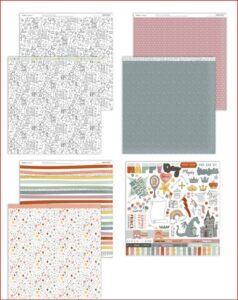 Today’s scrapbook market is a plethera of choice, not as much as 15 years ago but still you have a choice when it comes to albums, tools , adhesives, cardstock and papers. If you love color and pattern, you love browsing patterns either in person or by turning catalog pages. But how do you know whether these beautiful patterns are safe for your scrapbooks? While Close to my Heart patterned paper is sold in kits, and we tell you they are acid and lignin free, most stores sell printed paper by the sheet, and only a few are labeled using tear-off strips. Unless the display is clearly marked, you usually cannot tell which company sells the paper and whether it is an acceptable quality. For the most part, scrapbookers must trust the retailer’s claims that everything on display is photo-safe.
Today’s scrapbook market is a plethera of choice, not as much as 15 years ago but still you have a choice when it comes to albums, tools , adhesives, cardstock and papers. If you love color and pattern, you love browsing patterns either in person or by turning catalog pages. But how do you know whether these beautiful patterns are safe for your scrapbooks? While Close to my Heart patterned paper is sold in kits, and we tell you they are acid and lignin free, most stores sell printed paper by the sheet, and only a few are labeled using tear-off strips. Unless the display is clearly marked, you usually cannot tell which company sells the paper and whether it is an acceptable quality. For the most part, scrapbookers must trust the retailer’s claims that everything on display is photo-safe.
Many reputable paper companies have a vital concern about the quality of their papers. Unfortunately, because scrapbooking is a hot market, many companies jumping on the bandwagon have less regard for quality than profit. Claims that a product is “photo-safe” or “archival” are not always based on a true understanding of what characteristics are important for safe scrapbook paper.
Fortunately, there are standards that define the characteristics of scrapbook paper. The accepted standard specifies that scrapbook paper be acid-free (pH’ between 7 and 10), buffered’ (atleast 2 % alkaline reserve), contain no more than 1 % lignin”. I once read that scrapbook paper also resist tearing. Since I use tearing as a technique in my scrapbooking, I am not sure about the resisting of tearing is actually true.
For scrapbook papers, a pH on the lower end of the specified range is preferable because of the potential effects of higher
alkaline paper on photographs.
Most companies that sell patterned paper don’t make it themselves; they buy the paper from a paper mill and have it printed and packaged. Ideally, printing inks should be colorfast, lightfast and pH -neutral, choices that often cost more money. The printing itself also affects the visual quality of the paper. Dust spots, smudges or other imperfections should be caught during press checks. Additionally, verifying that the colors stay the same from batch to batch makes it easier for consumers to match papers in their scrapbooks. You can see this evidenced by the paper packs Close to my Heart offers, colors always go together in the kits, and you can use those colors as a guide when putting pages together.
Understanding the requirements of a quality printed paper still raises the same question. How do you know which papers meet these requirements? Close to my Heart is very upfront about the quality of their paper, unfortunately, finding this information with other papers is not as easy. Start by asking the person or store owner who sold you the paper. If they cannot provide the answers, call the paper company. Ask them whether their paper stock meets the standards for permanence and how the company ensures their paper quality on an ongoing basis. The answers will help you know whether to have confidence in a particular brand .
In addition to researching paper composition, you can also take several practical steps to ensure the quality of your papers. When choosing printed paper, visually inspect it for imperfections and determine whether it is an adequate weight for your purposes. I prefer a heavier weight than I find in big box craft stores. I like a good weight as base pages, so my photos are protected. If you are going to use a die-cut machine, the weight is important. There is nothing more frustrating than cutting an element only to have it tear as you remove it from the sticky mat. Don’t pick the first piece on the stack it’s been most exposed to the environment, including fingerprints from other consumers” Lastly
Finally, treat paper with care.. Store papers away from excessive heat, light and humidity, and avoid unnecessary handling, which can cause wear, tear and contamination. Remembering these things will help you put together a scrapbook that will withstand the test of time.
Leave a Reply